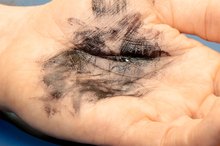What does fact checked mean?
At Healthfully, we strive to deliver objective content that is accurate and up-to-date. Our team periodically reviews articles in order to ensure content quality. The sources cited below consist of evidence from peer-reviewed journals, prominent medical organizations, academic associations, and government data.
- Emerging Infectious Diseases: Hand Sanitizer Alert
- Emerging Infectious Diseases: Hand Sanitizer Alert
- Centers for Disease Control and Prevention: Handwashing -- Clean Hands Save Lives
- Antimicrobial Agents and Chemotherapy: Effectiveness of Hand Sanitizers with and without Organic Agents for Removal of Rhinovirus from Hands
- Antimicrobial Agents and Chemotherapy: Effectiveness of Hand Sanitizers with and without Organic Agents for Removal of Rhinovirus from Hands
- U.S. Food and Drug Administration: Topical Antimicrobial Drug Products for Over-the-counter Human Use
The information contained on this site is for informational purposes only, and should not be used as a substitute for the advice of a professional health care provider. Please check with the appropriate physician regarding health questions and concerns. Although we strive to deliver accurate and up-to-date information, no guarantee to that effect is made.
Ingredients in Hand Sanitizer
Although it may seem hard to believe, your hands harbor 10,000 to 10 million bacteria at this very moment. While most of these germs do not pose a health threat, the trick is to reduce the disease-causing bugs to levels low enough for your immune system to handle. According to the Centers for Disease Control and Prevention, hand washing with soap and water is the preferred method for keeping your hands clean 2. However, if soap and water are not available, hand sanitizer containing at least 60 percent alcohol is recommended.
Active Ingredient
The active ingredient in hand sanitizer is usually an alcohol. The U.S. Food and Drug Administration and the Centers for Disease Control recommend ethyl alcohol, isopropyl alcohol or a combination of both in concentrations ranging from 60 to 95 percent. Alcohol is an antimicrobial that kills bacteria. Benzalkonium chloride is another FDA-approved active ingredient in some hand sanitzers. Although it is not an alcohol, benzalkonium chloride also works to kill bacteria and some viruses on the hands.
- The active ingredient in hand sanitizer is usually an alcohol.
- Although it is not an alcohol, benzalkonium chloride also works to kill bacteria and some viruses on the hands.
Humectants
Purell Hand Sanitizer Ingredients
Learn More
Humectants are chemicals added to hand sanitizers to attract moisture to the skin surface. Glycerin and propylene glycol are humectants commonly used in these products. By "holding" water, they help prevent your skin from drying with frequent use of hand sanitizer.
- Humectants are chemicals added to hand sanitizers to attract moisture to the skin surface.
Emollients and Moisturizers
Isopropyl myristate is an emollient, which is a chemical that seals the skin surface and makes it smoother. It is made from a substance naturally found in nutmeg, coconut oil and some animal fats. Many hand contain isopropyl myristate and moisturizers, such as aloe vera and tocopherol acetate, or synthetic vitamin E.
Emulsifiers
How Does Hand Sanitizer Kill Bacteria?
Learn More
Carbomer and amniomethyl propanol are common ingredients used as binding agents. Emulsifiers keep other ingredients from separating and thicken the hand sanitizer into a gel.
Other Ingredients
Hand sanitizer manufacturers include other ingredients, such as fragrance and FDA-approved colorants, to distinguish their products from competitors.
Related Articles
References
- Emerging Infectious Diseases: Hand Sanitizer Alert
- Centers for Disease Control and Prevention: Handwashing -- Clean Hands Save Lives
- Antimicrobial Agents and Chemotherapy: Effectiveness of Hand Sanitizers with and without Organic Agents for Removal of Rhinovirus from Hands
- Centers for Disease Control and Prevention. CDC Statement for Healthcare Personnel on Hand Hygiene during the Response to the International Emergence of COVID-19. Updated March 14, 2020.
- Centers for Disease Control and Prevention. Chemical disinfectants. Updated September 18, 2016.
- Centers for Disease Control and Prevention. When and How to Wash Your Hands. Updated October 3, 2019.
- Vermeil T, Peters A, Kilpatrick C, Pires D, Allegranzi B, Pittet D. Hand hygiene in hospitals: anatomy of a revolution. J Hosp Infect. 2019;101(4):383-392. doi:10.1016/j.jhin.2018.09.003
- McEgan R, Danyluk MD. Evaluation of aqueous and alcohol-based quaternary ammonium sanitizers for inactivating Salmonella spp., Escherichia coli O157:H7, and Listeria monocytogenes on peanut and pistachio shells. Food Microbiol. 2015;47:93-98. doi:10.1016/j.fm.2014.11.010
- Inaida S, Shobugawa Y, Matsuno S, Saito R, Suzuki H. Delayed norovirus epidemic in the 2009-2010 season in Japan: potential relationship with intensive hand sanitizer use for pandemic influenza. Epidemiol Infect. 2016;144(12):2561-2567. doi:10.1017/S0950268816000984
- Stebbins S, Cummings DA, Stark JH, et al. Reduction in the incidence of influenza A but not influenza B associated with use of hand sanitizer and cough hygiene in schools: a randomized controlled trial. Pediatr Infect Dis J. 2011;30(11):921-926. doi:10.1097/INF.0b013e3182218656
- Azor-Martinez E, Yui-Hifume R, Muñoz-Vico FJ, et al. Effectiveness of a hand hygiene program at child care centers: A cluster randomized trial. Pediatrics. 2018;142(5):e20181245. doi:10.1542/peds.2018-1245
- Blaney DD, Daly ER, Kirkland KB, Tongren JE, Kelso PT, Talbot EA. Use of alcohol-based hand sanitizers as a risk factor for norovirus outbreaks in long-term care facilities in northern New England: December 2006 to March 2007. Am J Infect Control. 2011;39(4):296-301. doi:10.1016/j.ajic.2010.10.010
- Wilson AM, Reynolds KA, Jaykus LA, Escudero-Abarca B, Gerba CP. Comparison of estimated norovirus infection risk reductions for a single fomite contact scenario with residual and nonresidual hand sanitizers. Am J Infect Control. 2019;S0196-6553(19)30846-6. doi:10.1016/j.ajic.2019.09.010
- Centers for Disease Control and Prevention. Handwashing: Clean hands save lives. Updated January 14, 2020.
Writer Bio
Based in Green Bay, Wisc., Jackie Lohrey has been writing professionally since 2009. In addition to writing web content and training manuals for small business clients and nonprofit organizations, including ERA Realtors and the Bay Area Humane Society, Lohrey also works as a finance data analyst for a global business outsourcing company.









